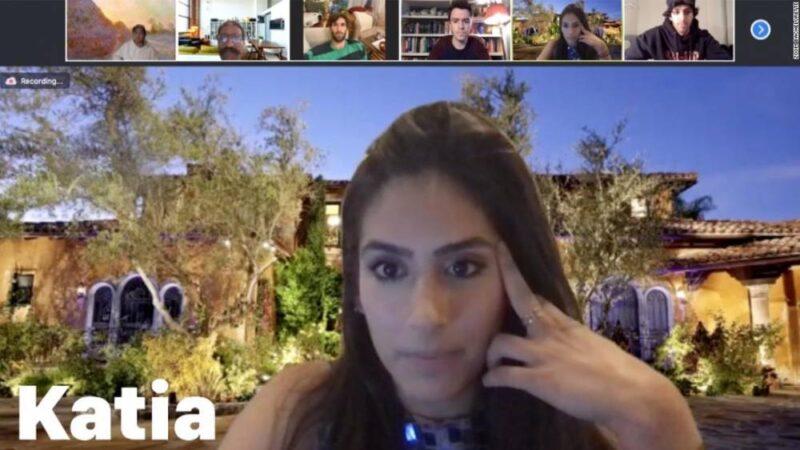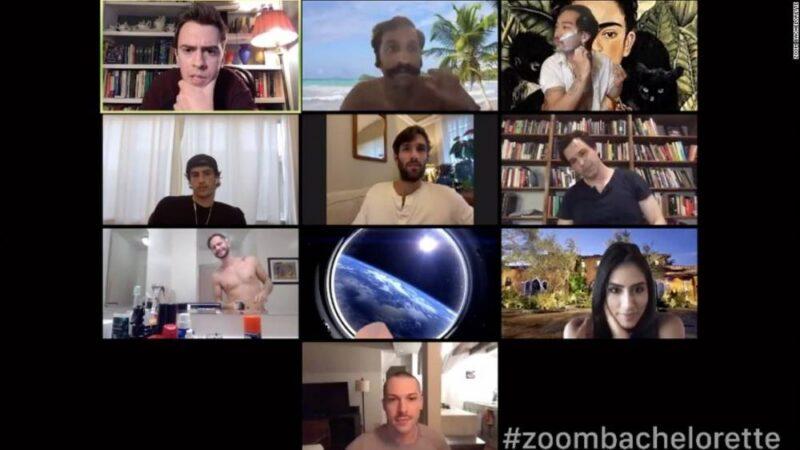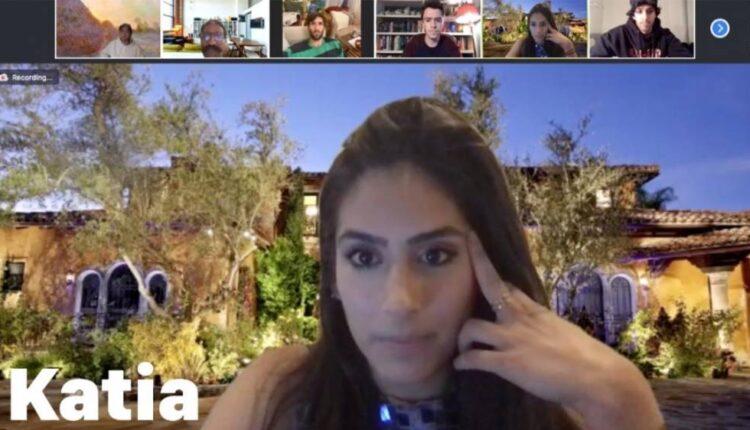(CNN Business)Katia Ameri had never been on a Zoom date before she found herself at the center of a three-hour virtual-dating event where 12 bachelors vied for her affection through the video-conferencing platform earlier this month.
Ameri, a 28-year-old entrepreneur, was the first “Zoom Bachelorette” — a twist on ABC’s “The Bachelorette” franchise for the quarantine times. As with the popular TV series, there were one-on-one dates, group dates, cocktail hours, and even a comedian host who gave Chris Harrison, the host of the ABC series, a run for his money. On the first group date, some of the men were asked to show off their quarantine grooming skills — they took scissors or razors to their locks and facial hair in an attempt to coif their unruly lockdown looks. On a second group date, they displayed their (oftentimes mediocre) culinary skills. It was all live-streamed on Twitch, where hundreds of viewers, who paid in the form of charitable donations in exchange for access to the viewing link, watched the full event and commented in real-time.

Katia Ameri’s Zoom background featured a photo of the iconic Bachelor mansion.Part reality show and part virtual-dating experiment, Zoom Bachelorette was an extreme version of a pandemic dating trend: video dates. Amid stay-at-home orders, many are eager to forge connections and dating apps have raced to encourage video conversations. Bumble and Hinge, for example, both added new features to help daters indicate they are ready to video chat as a next step in the conversation.Some, like Jean Yang, have created new alternatives to dating apps to help their single friends feel a little less lonely during the pandemic. Yang, a computer scientist who is based in San Francisco, is one of the creators of “Zoom Bachelorette” — an idea that stemmed from a side gig she started when much of the country was beginning to shelter in place.Read MoreIn late March, Yang, who is the founder and CEO of Akita Software, tweeted about how she set up some friends for a Zoom date, which she said led to more people asking to be similarly set up. “I didn’t know who to set them up with. As a technologist, my solution was to rely on technology, so I put up a Google form and posted it to my Facebook,” said Yang, who said she had no prior matchmaking experience. The form asked for simple information like “What are you looking for?” The responses to select from included: “A serious Zoom relationship; A casual Zoom relationship; New friends; Any of the above,” and whether they’d be comfortable with a blind setup.
Last week, I was half seriously telling people to use Zoom for dating. It turned out there was interest, so I made a Google Form. There's been enough volume that I needed an FAQ.
Now I'd like you to meet JEANDATE: Find love while sheltering in place.https://t.co/4xvMxK2uwI pic.twitter.com/aOQjvhFAbH
— Jean Yang ⚡ (@jeanqasaur) April 6, 2020 Soon after, she launched a website called JeanDate.com. She said she’s made about 100 matches so far, and roughly 30 of those have gone on to second dates; hundreds of people are on her waitlist to be matched. Unlike dating apps, which typically use algorithms to surface potential matches, Yang’s matchmaking is manual. She’ll typically text with people to find out what they’re looking for, any dealbreakers, and their ideal Zoom date, as well as ask for social media links to glean more about a person’s life. It is free of charge, but Yang is encouraging people to contribute to the National Domestic Violence Hotline. Because Yang’s time is limited, she said it is unlikely she’ll extend it far beyond her friend group, but she is encouraging others to set up spinoffs of JeanDate.A mutual friend connected Yang to Maria Shen, an investor who is running her own lockdown matchmaking service inspired by another reality show — Netflix’s “Love is Blind” — and is connecting singles blindly on Slack. Over a Zoom coffee meeting, the two discussed the idea of a Zoom Bachelorette show and decided to do it for charity, asking people who wanted to watch to donate at least $15 dollars in order to get access to the livestream link. They said they’ve raised roughly $42,000 for Feeding America.The two tapped their networks to find participants, and word started to spread on Twitter among those in the information-security world as well as the new invite-only social networking app, Clubhouse. The addition of one contestant in particular, Dino Dai Zovi, a well-known computer security researcher and speaker, attracted donations from some big names in the info-security industry, Yang said.

On a virtual group date, some of the men were asked to show off their grooming skills.”I thought it sounded like a lot of fun. Saturday night in quarantine — what else am I going to do?” said Dai Zovi, who lives in New York City. Prior to the event, Dai Zovi said he had been on a few Zoom dates via JeanDate but the prolonged stay-at-home orders have made it hard to progress. “What I found a little challenging is, after a few Zoom conversations, you don’t know what to do next,” he said.Jen Aprahamian, a product manager at Twitch who helped moderate comments for Zoom Bachelorette, said she was also set up by Yang. Prior to one date, she and her match bought the same ingredients to cook a meal together over Zoom.”An activity makes it easier to connect, it lowers the pressure when we’re trying to connect with somebody new and so people are using these activities and hacking together really interesting experiences,” Tinder CEO Elie Seidman told CNN Business.Tinder plans to roll out video-chat capabilities in its app this quarter as the company looks to create digital hangout opportunities. He pointed to the company’s Swipe Night event last fall, which had people hanging out on Tinder at the same time to watch an interactive show and then discuss it with matches, as an example of the second wave of app-based dating.Bumble CEO Whitney Wolfe Herd said earlier this month that the app is seeing a “surge” in people using features like video during the pandemic. “If you do a video call and you really hit it off, there’s a much higher likelihood that that first physical meetup is going to go well,” she said on an episode of the Boss Files podcast with CNN’s Poppy Harlow. “So this saves everybody time. It saves them risk. It encourages good health across the board.”While video chatting has become more commonplace during the pandemic, it’s unclear how the trend will be impacted once physical meetups become more viable. “It’s hard to think about Zoom dating absent of thinking about the implied lack of human contact associated,” Andrew Morris, a founder and CEO of a cybersecurity startup and one of the contestants on “Zoom Bachelorette,” told CNN Business. “Maybe I’m projecting, but I think everyone is pretty lonely right now. I am certainly a lot lonelier right now than I would usually be,” said Morris, adding that while he typically wouldn’t find a Zoom date so appealing, “now, I’ll take what I can get.” While he didn’t win Ameri’s love, he said he has since had several women reach out to him through emails, Twitter DMs, and texts after seeing him participate in the event. “I certainly have never had women coming out of the woodwork trying to have a date with me,” he said. He’s since gone on two Zoom dates, including one with a woman he was connected to after the event.
I look low maintenance, right? 👸 #zoombachelorette pic.twitter.com/EgTwWUeRKn
— Katia Ameri (@KatiaAmeri) April 30, 2020 As for Ameri, who is the founder and CEO of skincare startup Mirra, she said she agreed to take part in Zoom Bachelorette not because “it was going to be a true shot at dating,” but because “it would be a really novel way to experiment with a new medium — a live reality television show over Zoom.”
Ameri, who lives in San Francisco but is quarantining with her family in Los Angeles, picked her man, Ronak Trivedi, the founder and CEO of Pietra, at the end of the event. They’ve since texted and had one FaceTime call but she said it is more of a friendship than anything else. Next up: A Zoom Bachelor event.
Source: edition.cnn.com

